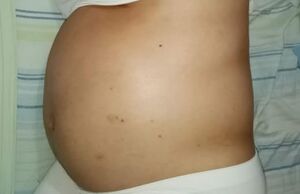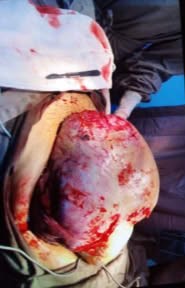Uterine Cancer recovery thanks to CDS: Difference between revisions
Created page with "left|thumb left|thumb right left|thumb This is a highly challenging and inoperable stage 4 uterine cancer that, after undergoing a comprehensive and effective CDS treatment, demonstrated a remarkable reduction in the size of the cancerous tumors. As a result of this significant..." |
No edit summary |
||
| (One intermediate revision by the same user not shown) | |||
| Line 1: | Line 1: | ||
[[File:Photo 546@21-10-2023 17-26-45 thumb.jpg|left|thumb]] | [[File:Photo 546@21-10-2023 17-26-45 thumb.jpg|left|thumb|'''Before''']] | ||
[[File:Photo 547@21-10-2023 17-26-45 thumb.jpg|left|thumb | [[File:Photo 547@21-10-2023 17-26-45 thumb.jpg|left|thumb|[[File:Photo 548@21-10-2023 17-26-45 thumb.jpg|left|thumb]]]] | ||
[[File:Photo | [[File:Photo 550@21-10-2023 17-26-45 thumb.jpg|left|'''After''']] | ||
[[File:Photo | '''Title:''' Case Report: Transition of Stage 4 Uterine Cancer from Inoperable to Operable Post-CDS Treatment | ||
This | |||
'''Abstract:''' This report discusses a case of advanced stage 4 uterine cancer characterized by multiple tumors initially deemed inoperable. Following a comprehensive and effective cancer-directed systemic (CDS) treatment regimen, significant tumor size reduction was observed, enabling surgical intervention. | |||
'''Introduction:''' Uterine cancer, particularly in its advanced stages, poses significant treatment challenges. Stage 4 uterine cancer often presents with extensive disease burden and metastatic spread, leading to a poor prognosis. Traditional treatment options may be limited when tumors are classified as inoperable. | |||
'''Case Presentation:''' A patient diagnosed with stage 4 uterine cancer underwent a targeted CDS treatment protocol. Imaging studies indicated a substantial reduction in tumor volume post-treatment. The previously inoperable tumors displayed characteristics indicative of operability. | |||
'''Discussion:''' The transformation of tumor status from inoperable to operable following CDS treatment highlights the potential for effective management of advanced uterine cancer. Surgical intervention may now be considered to achieve complete resection of cancerous tissues, improving the patient's prognosis and quality of life. | |||
'''Conclusion:''' This case illustrates the efficacy of CDS treatment in managing advanced uterine cancer, facilitating a shift from an inoperable to an operable state and paving the way for potential curative surgical options. Further studies are warranted to evaluate long-term outcomes and refine treatment protocols for similar cases. | |||
Latest revision as of 15:19, 25 August 2024




Title: Case Report: Transition of Stage 4 Uterine Cancer from Inoperable to Operable Post-CDS Treatment
Abstract: This report discusses a case of advanced stage 4 uterine cancer characterized by multiple tumors initially deemed inoperable. Following a comprehensive and effective cancer-directed systemic (CDS) treatment regimen, significant tumor size reduction was observed, enabling surgical intervention.
Introduction: Uterine cancer, particularly in its advanced stages, poses significant treatment challenges. Stage 4 uterine cancer often presents with extensive disease burden and metastatic spread, leading to a poor prognosis. Traditional treatment options may be limited when tumors are classified as inoperable.
Case Presentation: A patient diagnosed with stage 4 uterine cancer underwent a targeted CDS treatment protocol. Imaging studies indicated a substantial reduction in tumor volume post-treatment. The previously inoperable tumors displayed characteristics indicative of operability.
Discussion: The transformation of tumor status from inoperable to operable following CDS treatment highlights the potential for effective management of advanced uterine cancer. Surgical intervention may now be considered to achieve complete resection of cancerous tissues, improving the patient's prognosis and quality of life.
Conclusion: This case illustrates the efficacy of CDS treatment in managing advanced uterine cancer, facilitating a shift from an inoperable to an operable state and paving the way for potential curative surgical options. Further studies are warranted to evaluate long-term outcomes and refine treatment protocols for similar cases.
